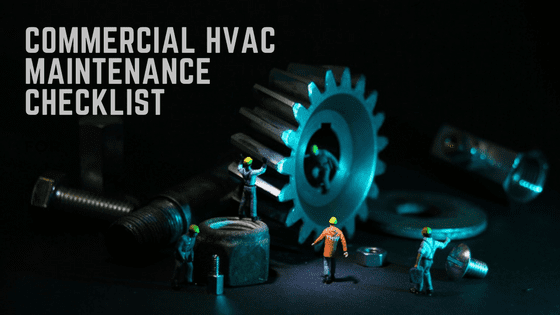Preventive commercial HVAC maintenance offers numerous benefits, which range from keeping equipment in good operating condition to ensuring that HVAC parts’ warranties remain valid.
Although a commercial HVAC maintenance schedule can vary greatly based on the size and needs of each commercial facility, HVAC technicians often follow specific steps when performing maintenance operations.
Here is a succinct commercial HVAC maintenance checklist that can help you ensure that your HVAC system is being taken care of properly.
Typical HVAC Maintenance Checkups
During regular commercial HVAC maintenance, the technician will inspect and service the following components.
The Central Cooling System:
- The compressor – The compressor must be checked for any startup problems and unusual sounds during operation. The levels of refrigerant and oil should be monitored closely. Insufficient refrigerant will negatively affect performance, eventually reducing equipment’s lifespan and increasing the energy consumption. If the refrigerant charge is low, the equipment should be inspected for leaks.
- Evaporator and condenser – Both the evaporator and condenser coils should be checked and cleaned regularly. Although dirt accumulation on the condenser coil doesn’t affect indoor air quality, dirty coils can lead to further complications, like poor ventilation, ice formation on the evaporator coil, and decreased system efficiency.
- Condensate lines and pans – Dirt accumulation in the drain pipe and/or pan can cause water leaks, often followed by water damage in different parts of the building. To avoid these problems, the condensate lines and pans should be cleaned regularly.
- Moving parts – Moving parts like fan motors, fan blades, belts, bearings, as well as gaskets and seals can become damaged due to regular wear and tear, or clogged with dust, dirt, and other debris. To prevent excessive friction and premature failure of equipment, all moving parts should be inspected and lubricated on a regular basis. The elements that show signs of deterioration should be discarded and replaced with new ones, as required.
- Switches, wiring, and connections – In addition to checking switches and wiring, the HVAC technician should tighten all the electrical connections and measure voltage on motors.
- Outdoor cabinet – The outdoor cabinet should also be checked for dirt buildup, leaks, rust, damage, and obstructions.
The Central Heating System:
- Heat Exchanger – The most common problem with heat exchangers is cracking of the metal. Because a cracked heat exchanger cannot be safely repaired, it must be replaced with a new one. When assessing the heat exchanger, the technician must also ensure proper gas flow.
- Burner and ignition system – The technician must inspect and clean the flame sensor, ignition assembly, and the burner assembly. The burner assembly may require adjustments for efficiency.
- The flue system – The flue system should be checked for proper attachment, dislocated sections, and signs of wear and tear.
During operation, the central heating system should be monitored for correct manifold gas pressures. Any adjustments required should be made according to the manufacturer’s specifications.
Ductwork and Vents
Because air ducts allow your HVAC system to transfer the conditioned air from the unit into your commercial space, regular air duct cleaning is critical to keep the air quality as high as possible.
Besides affecting indoor air quality, dust and dirt accumulation inside air ducts will eventually decrease airflow. This can cause evaporator coils to freeze, potentially leading to water leaks, higher energy bills, and premature compressor failure.
Air Filters
Air filters are installed to catch air borne particles from entering HVAC systems. Clogged filters will have the same effects on an HVAC system as dust and dirt accumulation inside air ducts. Depending on the requirements of each commercial facility, the filters should be checked every three or four weeks, and cleaned or replaced as required.
“Zoning” Devices
When checking thermostats, sensors, and “dampers”, an HVAC technician should measure temperature and humidity levels throughout the building. This can help him ensure that all the “zoning” devices are working properly.
Because preventive HVAC maintenance also serves as a tune-up for your system, the HVAC technician can recommend the best temperature levels for optimum system performance and adjust your “zoning devices” to reflect the fluctuating thermal loads specific to each season.
If you suspect that there’s something wrong with your commercial HVAC compressor, Compressors Unlimited offers a unique control procedure that covers all the aspects of the compressor remanufacturing process. Since each compressor that we remanufacture is dealt with as an individual project, you can count on our remanufactured compressors to keep your HVAC system running at peak performance.












